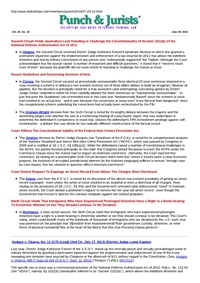Loaded on
July 29, 2013
published in Punch and Jurists
July 29, 2013
This decision is noted for its detailed discussion of an important new prosecutorial weapon - namely the Matthew Shepard and James Bird Hate Crime Prevention Act (“HCPA” or the “Act”), which is codified in scattered sections of the U.S. Code, but principally at 18 U.S.C. § 249(a)(2); and for …
Loaded on
July 29, 2013
published in Punch and Jurists
July 29, 2013
This decision dealt principally with the issue of whether three identical sentences of 240 months (20 years) that were imposed on three defendant/appellants who were convicted of a single count of conspiracy to commit mail fraud and wire fraud, were “procedurally unreasonable”?
What makes this decision stand out are …
Loaded on
July 29, 2013
published in Punch and Jurists
July 29, 2013
Last year, District Judge Katherine Forrest of the S.D.N.Y. shook up the normally placid and virtually unchallenged world of military detentions by granting a permanent injunction against the implementation and enforcement of one of the many sweeping anti-terrorism laws enacted by Congress in the aftermath of 9/11 without regard …
Loaded on
July 29, 2013
published in Punch and Jurists
July 29, 2013
This is another of the many recent cases dealing with America’s growing and ugly predilection for locking people for long periods of time up without giving them a hearing. In this case, the issue was the plight of the thousands upon thousands of immigrants who are locked up on …
Loaded on
July 29, 2013
published in Punch and Jurists
July 29, 2013
This decision is noted for its discussion of the almost non-existent possibility of getting an arrest record expunged under 28 USC § 534 - even where, as here, the Government moved to dismiss the criminal complaint without prejudice.
This decision is noted as a good example of why …
Loaded on
July 29, 2013
published in Punch and Jurists
July 29, 2013
This is an interesting sentencing case in which a divided panel rejected the defendant’s contention that the district court had violated his Fifth Amendment right against self-incrimination by considering at sentencing information from a psychiatric examination that was undertaken to determine the defendant’s competence and cognitive function. In a …
